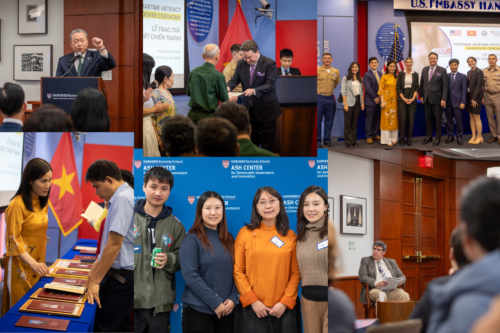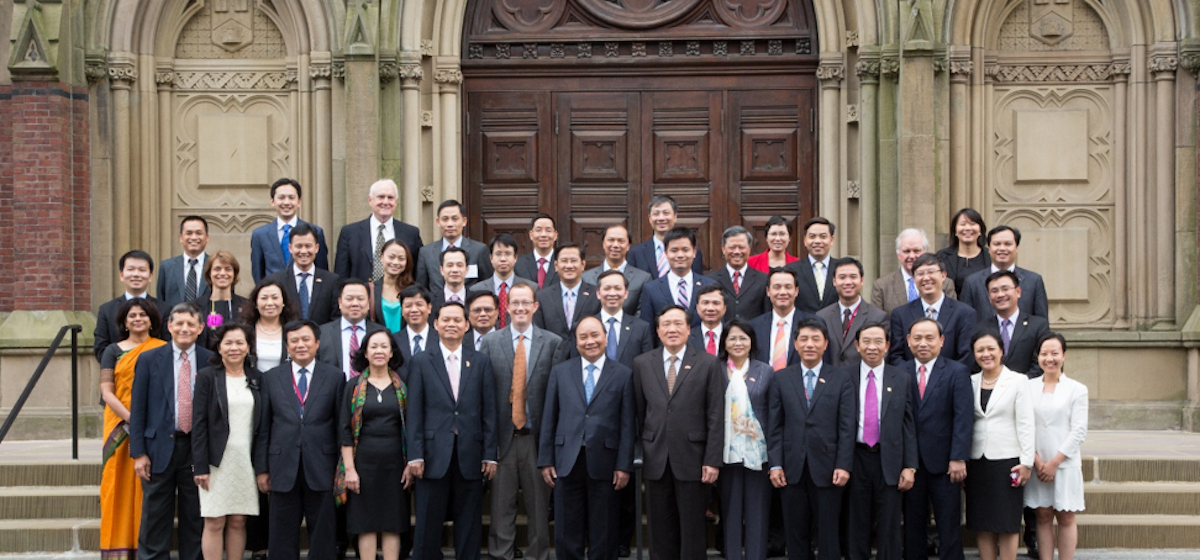The Ash Center sat down with Dr. Vu Thanh Tu Anh, Dean of the Fulbright School of Public Policy and Management, the first academic unit of Fulbright University of Vietnam. Dr. Tu Anh, also a non-resident fellow at the Ash Center, was in Cambridge for the 10th anniversary of the Vietnam Executive Leadership Program (VELP), an executive education program run by the Ash Center, which provides public policy training to senior Vietnamese government officials.
Q: How did VELP get started?
Dr. Tu Anh: It started in 2008, which is exactly 10 years ago. The idea at that time was we really want to create a very high-level forum where the leadership of Vietnam could have a frank and open discussion about the challenges facing Vietnam. And remember that was during the global economic crisis, so it was a very timely initiative, created to help Vietnam better understand the global political and financial crosscurrents of that moment.
Q: Who generally participates in the program?
Dr. Tu Anh: The Vietnamese delegation consists of about 15 to 20 members. It varies from year to year. But the delegation could be led by either a Deputy Prime Minister responsible for the economy or the Chairman of the National Assembly, which is like the Congress in the US. Members can also be at the Minister or Vice Minister-level. The composition of the program attendees depends on the portfolio of the delegation chair. If the leader is the Deputy Prime Minister responsible for the economy, then you will see the Ministry of Finance, Ministry of Planning and Investment, Ministry of Trade and Industry, and so forth. We have also had the Vice Chairwoman of the National Assembly, who helped bring the Minister of Justice, and other senior officials from that ministry, just to give you an example of the level of participants who take part in the program.
Q: So it’s fair to say that the program includes some of the most senior-ranking officials in Vietnam?
Dr. Tu Anh: Yes. It’s the most senior leadership program that Vietnam has ever had anywhere in the world.
Q: What does a typical VELP session look like?
Dr. Tu Anh: Normally the program lasts for five days, and then each day’s presentation could be grouped around a specific policy theme. Normally the first day we talk about the global economy to set the stage for the following discussion in the next four days. Basically, in the first day, we talk about the world itself and the implications for Vietnam. And then, as I mentioned earlier, depending on the delegation chair’s policy portfolio, we will delve into other policy areas. For example, in some years we talk about how to reform the domestic economy, mainly, for example, the state-owned enterprises, the state-owned banks, and land use policy in Vietnam. Land policy is a big topic because, in Vietnam, land is still under the ownership of the governments of the state.
We also talk a lot about trade, because Vietnam is one of the most open economies in the world. If you look at trade ratio to GDP, Vietnam is now probably second to Singapore. Education is also a big topic because it’s one of the most important reforms being examined in Vietnam today. The program also delves into institutional reform and legal reform in Vietnam—basically to establish the rule of law and the connection between the rule of law and economic developments.
Q: Who teaches? Who are some of the faculty members and other scholars who run some of the sessions?
Dr. Tu Anh: There are basically three groups of faculty members. The first group is Ash and Harvard Kennedy School professors. For example, Tony Saich, Jay Rosengard, David Dapice, and Tom Vallely often participate on the Harvard side. The second group is Vietnamese faculty member from my school, the Fulbright School of Public Policy and Management, and now FUV. Then the third group is practitioners, be they bankers discussing global economic trends, or someone from Google. For example, a practioner might come to talk about how to build up the IT sector and infrastructure in Vietnam. We’ve also heard from climate change experts about how climate change is impacting Vietnam, as well as foreign policy experts about US policy in Vietnam and Asia more generally.
Q: It sounds like a very impactful series of gatherings. Are there plans to continue the program into the future?
Dr. Tu Anh: Absolutely. The VELP team recently met with the Prime Minister about the program, and he was very interested in continuing this important collaboration.





